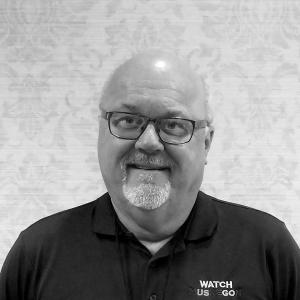Dave Alexander

Collecting Stories at the National Working Waterfronts and Waterways Symposium 2018
Collecting Stories at the National Working Waterfronts and Waterways Symposium 2018 is a project of Maine Sea Grant, College of the Atlantic, the Island Institute, and the National Working Waterfront Network.
National Capital Contracting
Dave Alexander is the Executive Director of Downtown Muskegon Now, in Muskegon, Michigan. His work is deeply rooted in the community, which is located on the shores of Lake Michigan and is the largest deep water port on their side of the lake in the state of Michigan. Alexander's community is also the largest urban community along that waterfront and the second largest county along that waterfront. His work is influenced by the unique geographical features of Muskegon, including Muskegon Lake, which he describes as defining the community. The lake, an extension of the Muskegon River, has been the community's working waterfront, serving various roles throughout history, from trading with the French to the lumbering era and the industrial era. Alexander's work involves navigating the challenges and opportunities presented by this waterfront, including the environmental impact of past industries and the potential for future development.
Scope and Content Note
The interview with Dave Alexander, conducted by Alexa Wutt from Michigan Sea Grant, provides a comprehensive overview of the history, challenges, and opportunities of the working waterfront in Muskegon, Michigan. Hespeaks about the history of the Muskegon Lake waterfront and how it has brought vitality to the economy and spiritual connections for local inhabitants through having public access to the waterfront with heritage landings and bike trails along the lake. He discusses the challenges of groundfield redevelopment—for office, recreational, commercial, or residential uses—since the industrial era with the waterfront’s aims to be delisted as an area of environmental concern and relisted as a mixed use area. Alexander describes the geographical and historical context of Muskegon, including its location on Lake Michigan, its status as the largest deep water port on their side of the lake in the state of Michigan, and its unique features such as Muskegon Lake. He traces the history of the waterfront from its early days of trading with the French, through the lumbering era, and into the industrial era, highlighting the environmental impact of these industries. Alexander also discusses the transformation of the waterfront, with a shift from heavy industry to more diverse uses, including recreational and commercial activities. He emphasizes the importance of a broad concept of "working" in relation to waterfronts, suggesting that what works in one location may not work in another, but that all are working towards the same goal. The interview concludes with a discussion on the potential for future development and the importance of the waterfront in shaping the community's identity.
Please Note: The oral histories in this collection are protected by copyright and have been created for educational, research and personal use as described by the Fair Use Doctrine in the U.S. Copyright law. Please reach out Voices@noaa.gov to let us know how these interviews are being used in your research, project, exhibit, etc. The Voices staff can help provide other useful resources related to your inquiry.
The NOAA mission is to understand and predict changes in climate, weather, oceans, and coasts, to share that knowledge and information with others, and to conserve and manage coastal and marine ecosystems and resources. The Voices Oral History Archives offers public access to a wide range of accounts, including historical materials that are products of their particular times, and may contain offensive language or negative stereotypes.
Voices Oral History Archives does not verify the accuracy of materials submitted to us. The opinions expressed in the interviews are those of the interviewee only. The interviews here have been made available to the public only after the interviewer has confirmed that they have obtained consent.
